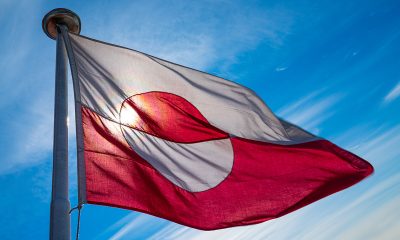European Union
Austrian police thwart attack against Vienna Pride parade
Three suspects sympathized with ISIS
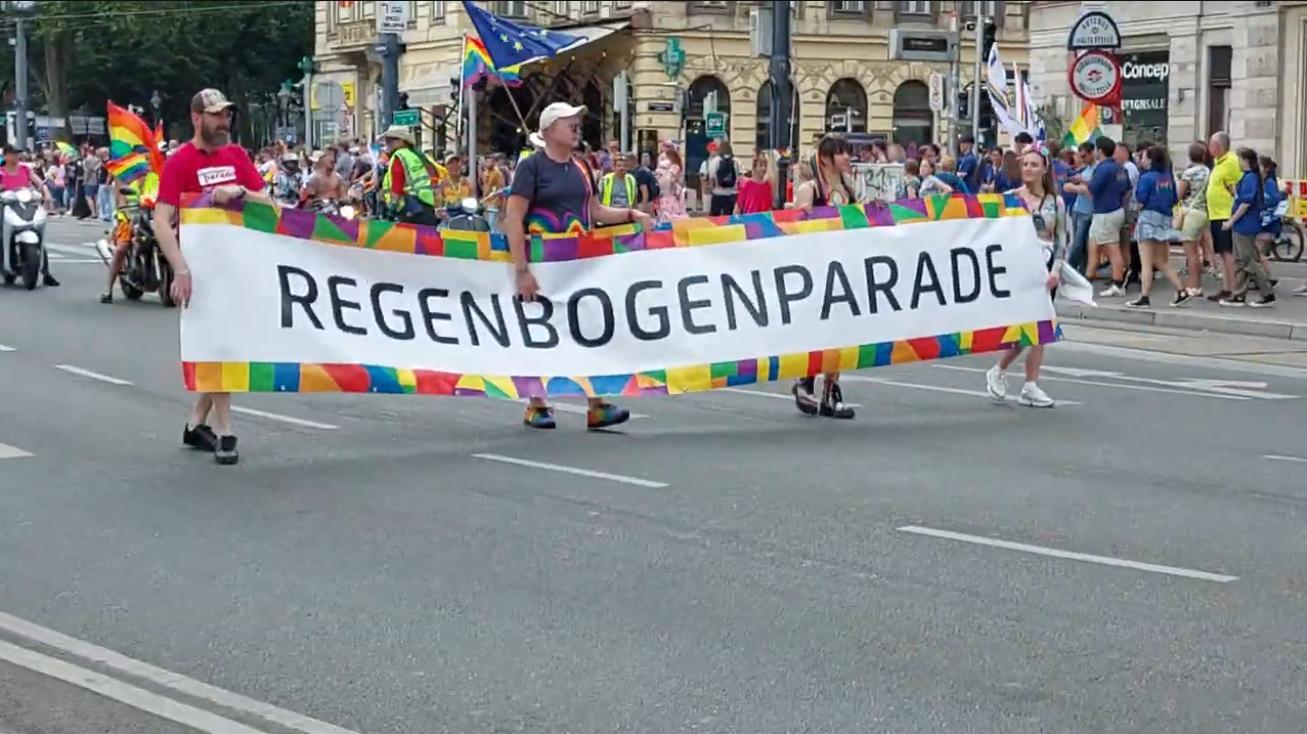
The head of Austria’s Directorate of State Security and Intelligence told reporters that a planned attack against the Viennese Pride Parade was prevented by the country’s Cobra special forces.
During a press conference, Omar Haijawi-Pirchner told reporters; “Through the successful and also timely intervention, we managed to defuse the moment of danger for Vienna Pride and to ensure the safety of all participants.”
The three suspects — Austrian citizens with Bosnian and Chechen roots, young men aged 14, 17 and 20 who had sympathized with the Islamic State militant group — were arrested on suspicion of planning to attack the parade prior to its start. The Vienna Pride Parade, held to celebrate LGBTQ rights, attracted around 300,000 people according to officials from the Austrian Directorate of State Security and Intelligence.
Haijawi-Pirchner told reporters Austrian police had waited to reveal details of the planned attack until after the parade to ensure participants did not feel anxious.
“That’s ultimately the goal of terrorism, to cause anxiety and fear in the public. It’s also our job not to let that happen,” he said.
Referring to the ISIS connection, Haijawi-Pirchner acknowledged: “There are calls to carry out attacks in Europe again and Europol [The European police organization] just a few days ago published a report to that effect,” he said. “We are taking this very seriously.”
The BBC noted that in November 2020, a gunman with ties to ISIS had opened fire in a popular nightlife area in Vienna, killing four people and injuring 23 others.
The organizers of Vienna Pride released a statement after the details of the foiled planned attack were made public:
“We will not be defeated by the enemies of LGBTIQ rights, democracy and an open society.
Today’s police coverage of (Saturday’s) Rainbow Parade Day shows all the more: LGBTIQ rights have been threatened with step back in number recently and we have to fight for our visibility and safety every day. Our answer to this must be louder: We will not let the enemies of the rights for LGBTIQ people, democracy and an open society defeat us!,” said Ann-Sophie Otte, head of the HOSI Vienna. And further: “Yesterday’s rainbow parade with over 300,000 participants is this loud and visible signal that we stand together here. “
There was no danger at any point to the participants.
“We are in intensive exchange with the security authorities all year round and thank you for the good and close cooperation also around the Rainbow Parade,” said the organizer of Vienna Pride, Katharina Kacerovsky-Strobl. And Ann-Sophie Otte adds: “This year’s Pride motto applies even more today and every day: Together we rise — against hate and fascism!”
Related:
Vienna Pride’s Regenbogenparade:
European Union
European Parliament resolution backs ‘full recognition of trans women as women’
Non-binding document outlines UN Commission on the Status of Women priorities

The European Parliament on Feb. 11 adopted a transgender-inclusive resolution ahead of next month’s U.N. Commission on the Status of Women meeting.
The resolution, which details the European Union’s priorities ahead of the meeting, specifically calls for “the full recognition of trans women as women.”
“Their inclusion is essential for the effectiveness of any gender-equality and anti-violence policies; call for recognition of and equal access for trans women to protection and support services,” reads the resolution that Erin in the Morning details.
The resolution, which is non-binding, passed by a 340-141 vote margin. Sixty-eight MPs abstained.
The commission will meet in New York from March 10-21.
A sweeping executive order that President Donald Trump signed shortly after he took office for a second time on Jan. 20, 2025, said the federal government’s “official policy” is “there are only two genders, male and female.” The Trump-Vance administration has withdrawn the U.S. from the U.N. LGBTI Core Group, a group of U.N. member states that have pledged to support LGBTQ and intersex rights, and dozens of other U.N. entities.
European Union
Top EU court: Poland must recognize same-sex marriage from other European countries
Activists celebrate landmark decision
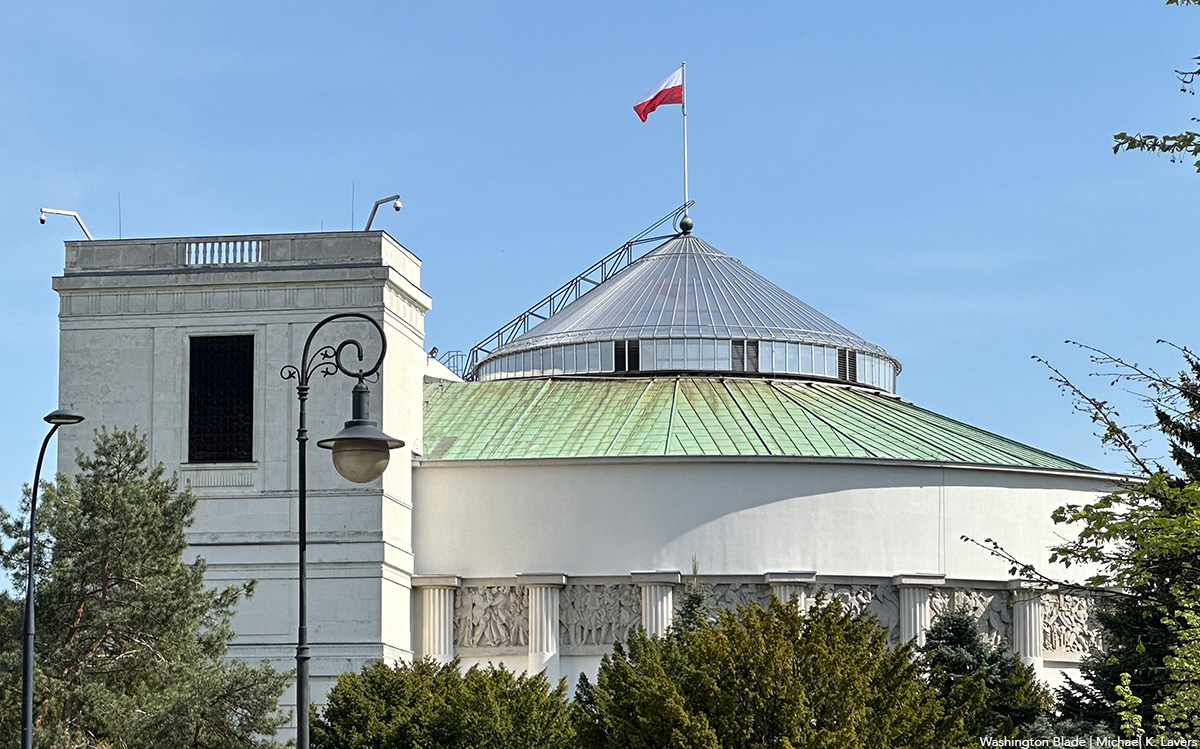
The European Union’s top court on Tuesday ruled member states must recognize same-sex marriages legally performed in other member states.
The EU Court of Justice in Luxembourg ruled in favor of a couple who challenged Poland’s refusal to recognize their German marriage.
ILGA-Europe notes Polish authorities refused “to transcribe into the civil register a certificate of same-sex marriage concluded” in Germany “between a Polish citizen and a Polish-German citizen … on the grounds that Polish law does not allow same-sex marriage.”
The couple who lives in Poland brought their case to Polish courts. The Polish Supreme Administrative Court referred it to the EU Court of Justice.
“Today’s ruling of the Court of Justice of the EU is of key importance not only for the couple involved in the case, but also for the entire LGBT+ community in Poland,” said the Campaign Against Homophobia, a Polish LGBTQ and intersex rights group, in response to the decision. “It clearly states that refusing to transcribe a marriage concluded abroad is incompatible with EU law. Therefore, regardless of the absence of registered partnerships and marriage equality, Poland must ensure the possibility of effective transcription.”
“With this judgment, the CJEU clearly states that the recognition of marriage status is key to enjoying EU citizens’ fundamental right to freedom of movement across the EU,” added ILGA-Europe Advocacy Director Katrin Hugendubel. “The EC now needs to ensure that this judgment is implemented quickly by the Polish state and across the EU.”
Sixteen EU countries — Ireland, Portugal, Spain, France, Luxembourg, Belgium, the Netherlands, Germany, Denmark, Austria, Slovenia, Malta, Greece, Sweden, Finland, and Estonia — have extended full marriage rights to same-sex couples. Poland, Romania, Bulgaria, and Slovakia are the EU countries with no legal recognition of same-sex couples.
European Union
Former Irish prime minister: Europe is leader in global LGBTQ rights movement
Leo Varadkar in 2017 became Ireland’s first gay head of government.
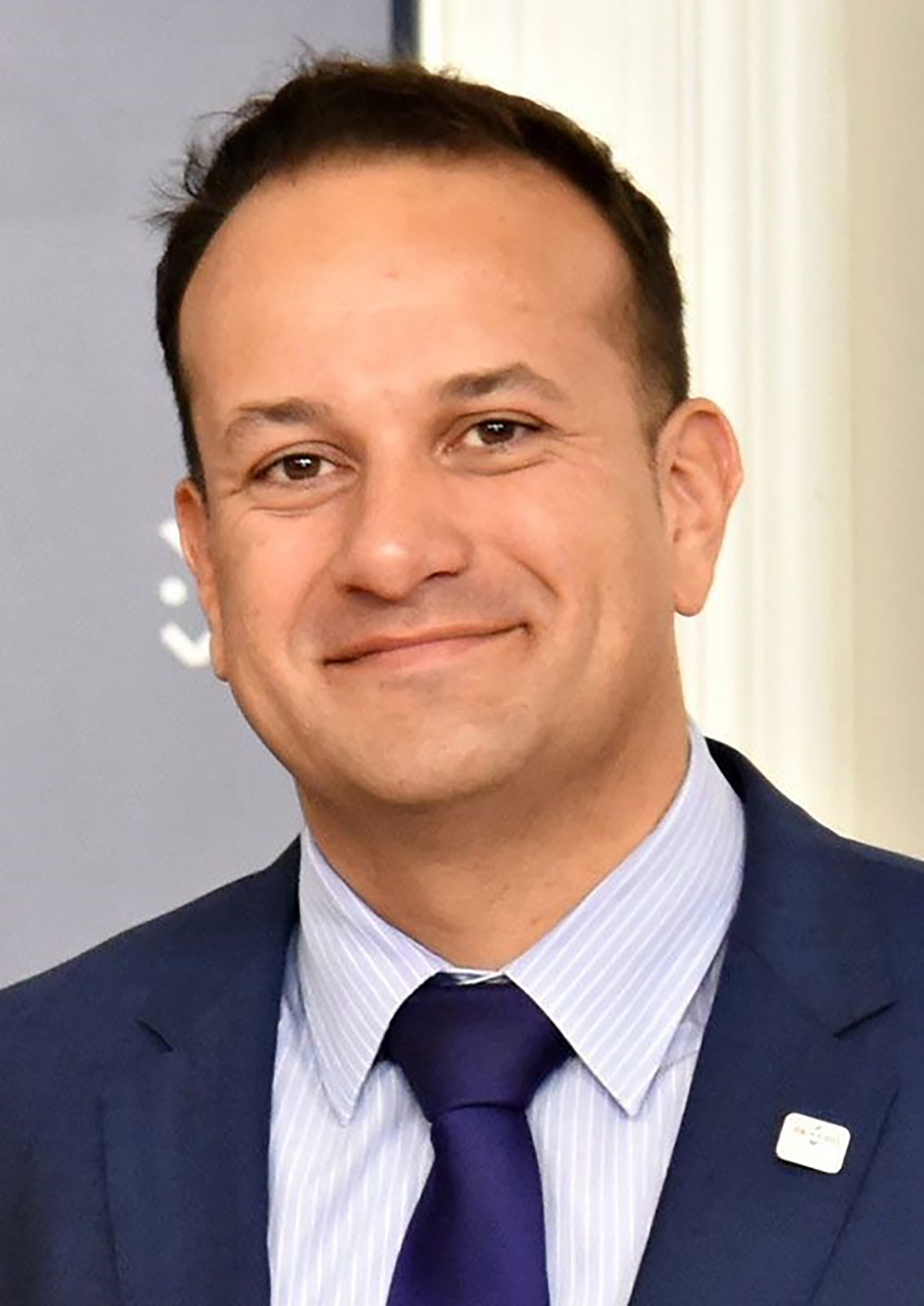
CAMBRIDGE, Mass. — Former Irish Prime Minister Leo Varadkar earlier this month said Europe is now at the forefront of the global LGBTQ and intersex rights movement.
“In many ways, Europe is the light,” he told the Washington Blade on Oct. 20 during an interview that took place near Harvard University. “It’s holding up against anti-LGBTQ policies.”
Varadkar, 46, in 2017 became Ireland’s first gay prime minister.
He stepped down in 2020 after his center-right party, Fine Gael, lost 15 parliament seats in the general election, but he remained in the government. Varadkar, whose father was born in Mumbai, in 2022 once again became prime minister.
Varadkar in 2024 resigned and stepped down as Fine Gael’s leader.
The Harvard Kennedy School’s Carr-Ryan Center for Human Rights on Oct. 16 announced Varadkar’s appointment as a senior fellow for its Global LGBTQI+ Human Rights Program for the 2025-2026 academic year. He — along with former Massachusetts Gov. Deval Patrick and former acting Treasury Secretary David Lebryk — are also Hauser Leaders at the Harvard Kennedy School’s Center for Public Leadership for this year’s fall semester.
Varadkar during his fellowship will focus on LGBTQ and intersex rights within the EU.
He sat down with the Blade on the same day he spoke at Harvard’s Weatherhead Center for International Affairs. Varadkar on Tuesday participated in an event in Brussels that focused on LGBTQ and intersex rights in the EU.
New EU LGBTQ strategy ‘not wonderful, but at least it was done’
The European Commission on Oct. 8 released an LGBTQ and intersex rights strategy that focuses on three specific areas:
- Protecting LGBTIQ+ people (from hate-motivated harassment and violence, from discrimination, from conversion practices)
- Empowering LGBTIQ+ people through (equality bodies, rainbow families, promoting inclusion at workplace)
- Engaging society to advance LGBTIQ+ equality by (calling on all EU countries to adopt national strategies, improving the data collection and analysis, launching an ‘LGBTIQ+ Policy Forum’)
“It’s not wonderful, but at least it was done,” said Varadkar. “You won’t see that done in China, Russia, or even the United States, unfortunately.”
“Europe needs to hold the line, but also we want to focus on places where there is backsliding, like Bulgaria, like Slovakia,” he added, while also referring to the Czech Republic and Hungary.
Varadkar is among those who participated in this year’s Budapest Pride, even though Hungarian Prime Minister Viktor Orbán’s government banned public LGBTQ events.
“It wasn’t just a regular Pride protest, and in Eastern Europe Pride is still a protest, very much so … they’re met by football hooligans, and police who aren’t necessarily there to support there to protect them,” Varadkar told the Blade. “This time, everyone joined in: students, unions, families, even more moderate political forces that might not always want to be associated with the LGBT cause, but it became about freedom of expression and became about free speech, and that’s why there was such a big turnout.”
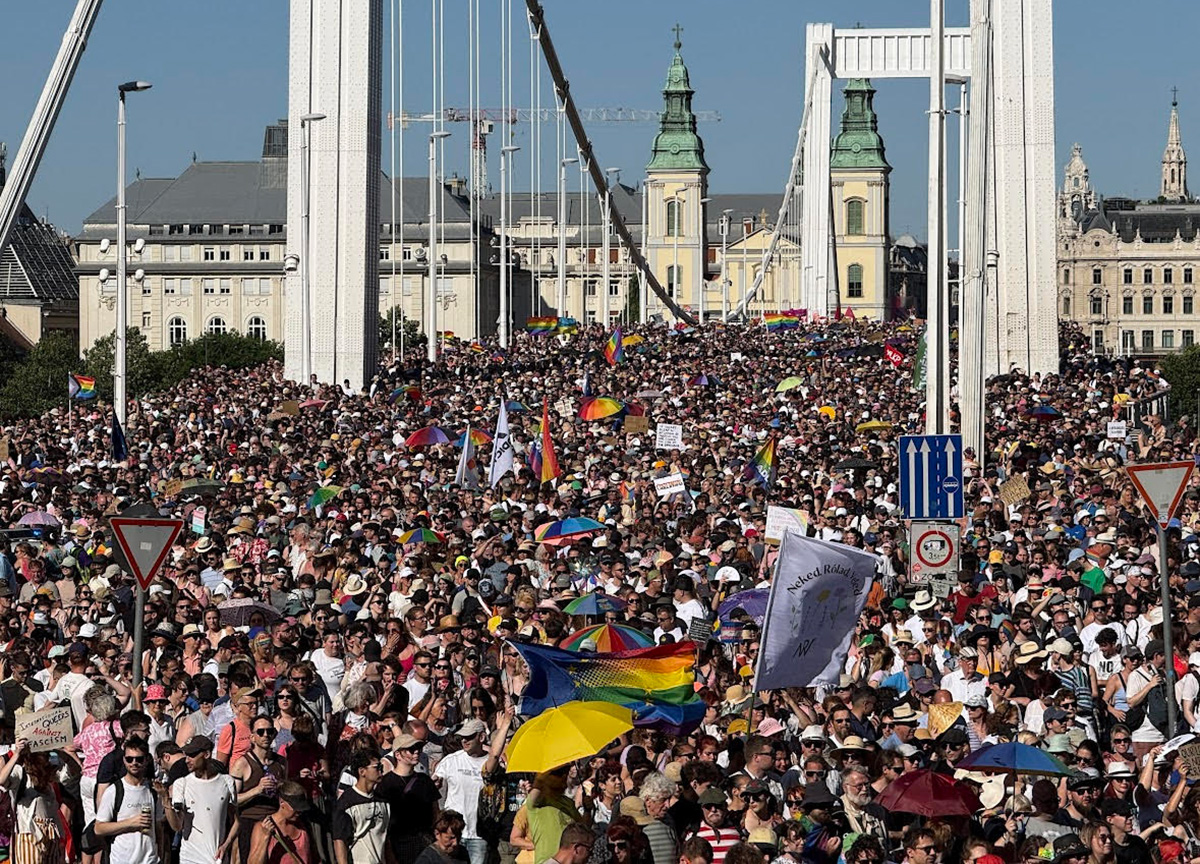
Varadkar since he left office has also traveled to Bulgaria to support the country’s LGBTQ activists. Varadkar also spoke to the Blade about Russia and the Kremlin’s efforts to “influence and destabilize European societies.”
Russia in 2022 launched its war against Ukraine.
“One of the ways they do that is through election interference and misinformation online, and they’ve identified this as an issue that can divide European societies,” said Varadkar, specifically referring to the Russian government’s opposition to LGBTQ rights and its overall human rights record. “[Russian President Vladimir] Putin has very much embraced the idea of traditional values and Russian Orthodox Christianity, and he’s using that as a wedge issue in Central and Eastern Europe.”
“So as ever our fight is part of a bigger fight that’s linked to things like democracy, human rights, academic freedom, press freedom,” added Varadkar. “We’re on the front line in the same battle, in my view.”
He also said the EU needs to be pragmatic in how it responds to Orbán and other anti-LGBTQ leaders.
“[The EU] is in a bit of a dilemma as to how it acts, how it does withdraw funding sometimes from countries if they’re in breach of the standards around the rule of law,” said Varadkar.
The European Commission in 2021 threatened to withhold funding to local and regional governments in Poland that declared themselves “LGBT-free zones.” The European Commission in 2022 sued Hungary over a law that a press release notes “singles out and targets content that ‘promotes or portrays’ what it refers to as ‘divergence from self-identity corresponding to sex at birth, sex change or homosexuality’ for individuals under 18.”
“Some of the more nationalist and populist leaders in Central and Eastern Europe; there’s nothing they want more than a fight with Brussels, these Western European elites … trying to impose their ideology on our country,” Varadkar told the Blade. “So that’s why I think the European Union has to be smart as to how it acts.”
European Commission President Ursula von der Leyen is among those who condemned the Budapest Pride ban. Varadkar told the Blade he “was disappointed there wasn’t more action” from Brussels “in relation to why Budapest Pride was being banned.”
Varadkar praises Sarah McBride
Ireland is among the countries that have issued travel advisories for transgender and nonbinary people who are planning to visit the U.S. since the Trump-Vance administration took office.
President Donald Trump shortly after his inauguration issued a sweeping executive order — Defending Women from Gender Ideology Extremism and Restoring Biological Truth to the Federal Government — that, among other things, bans the State Department from issuing passports with “X” gender markers. Trump in his inaugural speech also said the federal government will only recognize two genders: male and female.
Trump in February issued another executive order that bans trans women and girls from female sports teams. U.S. Citizenship and Immigration Services in August announced it will ensure “male aliens seeking immigration benefits aren’t coming to the U.S. to participate in women’s sports.”
The promotion of LGBTQ and intersex rights abroad was a cornerstone of the Biden-Harris administration’s overall foreign policy.
Secretary of State Marco Rubio on Jan. 24 directed State Department personnel to stop nearly all U.S. foreign aid spending for 90 days in response to an executive order that Trump signed after his inauguration. Rubio later issued a waiver that allowed PEPFAR and other “life-saving humanitarian assistance” programs to continue operating after bowing to pressure, but the Blade has reported PEPFAR-funded programs in Kenya and other African countries have been forced to suspend services and even shut down because of gaps in U.S. funding.
Rubio in March announced 83 percent of U.S. Agency for International Development contacts had been cancelled, and the State Department would administer the remaining programs. USAID officially shut down on July 1.
The global LGBTQ and intersex rights movement has lost more than an estimated $50 million in funding since the Trump-Vance administration took office.
“It has an impact, particularly on organizations in the Global South and in Central and Eastern Europe,” said Varadkar.

Varadkar told the Blade he is working with the Global Development Project and other philanthropic organizations to “fill some of the gap” in funding.
He said the current situation “demonstrates why we should never be too dependent on any government or corporations.” Varadkar also spoke more broadly about the Trump-Vance administration and its policies.
“I’m a guest in this country. I’m not here to tell you what to do. The American people decide who the president is. I don’t, but I am genuinely disappointed to see the backsliding on human rights and academic freedom and free speech here in America,” said Varadkar.
“What do I associate America with? I associate it with being one of the homes of democracy and helping to spread it around the world. I associate it with free speech, sometimes even saying any crazy thing you want. And I associate it with as being the birthplace of the LGBT liberation movement. I think of Stonewall. I think of the Castro,” he added. “It all started here, long before anyone in Ireland could ever imagine homosexual acts being decriminalized, let alone a gay person being the head of government.”
“To me this is where it all started,” said Varadkar. “It’s particularly worrying that things appear to be going in the wrong direction here, and that has impacts in the rest of the world too, that Americans might be very aware of.”
Varadkar also said he admires U.S. Rep. Sarah McBride (D-Del.), who in 2024 became the first openly trans person elected to Congress.
“She’s there for everyone in Delaware, and yes, she is trans too,” Varadkar told the Blade. “She’s willing to be a leader, but I think as LGBT leaders, we should make sure that our causes are part of the wider welfare and society and not separate.”
-

 Movies5 days ago
Movies5 days agoRadical reframing highlights the ‘Wuthering’ highs and lows of a classic
-

 District of Columbia4 days ago
District of Columbia4 days agoJudge rescinds order against activist in Capital Pride lawsuit
-

 District of Columbia4 days ago
District of Columbia4 days agoTrans activists arrested outside HHS headquarters in D.C.
-

 Ecuador5 days ago
Ecuador5 days agoJusticia reconoce delito de odio en caso de bullying en Instituto Nacional Mejía de Ecuador



